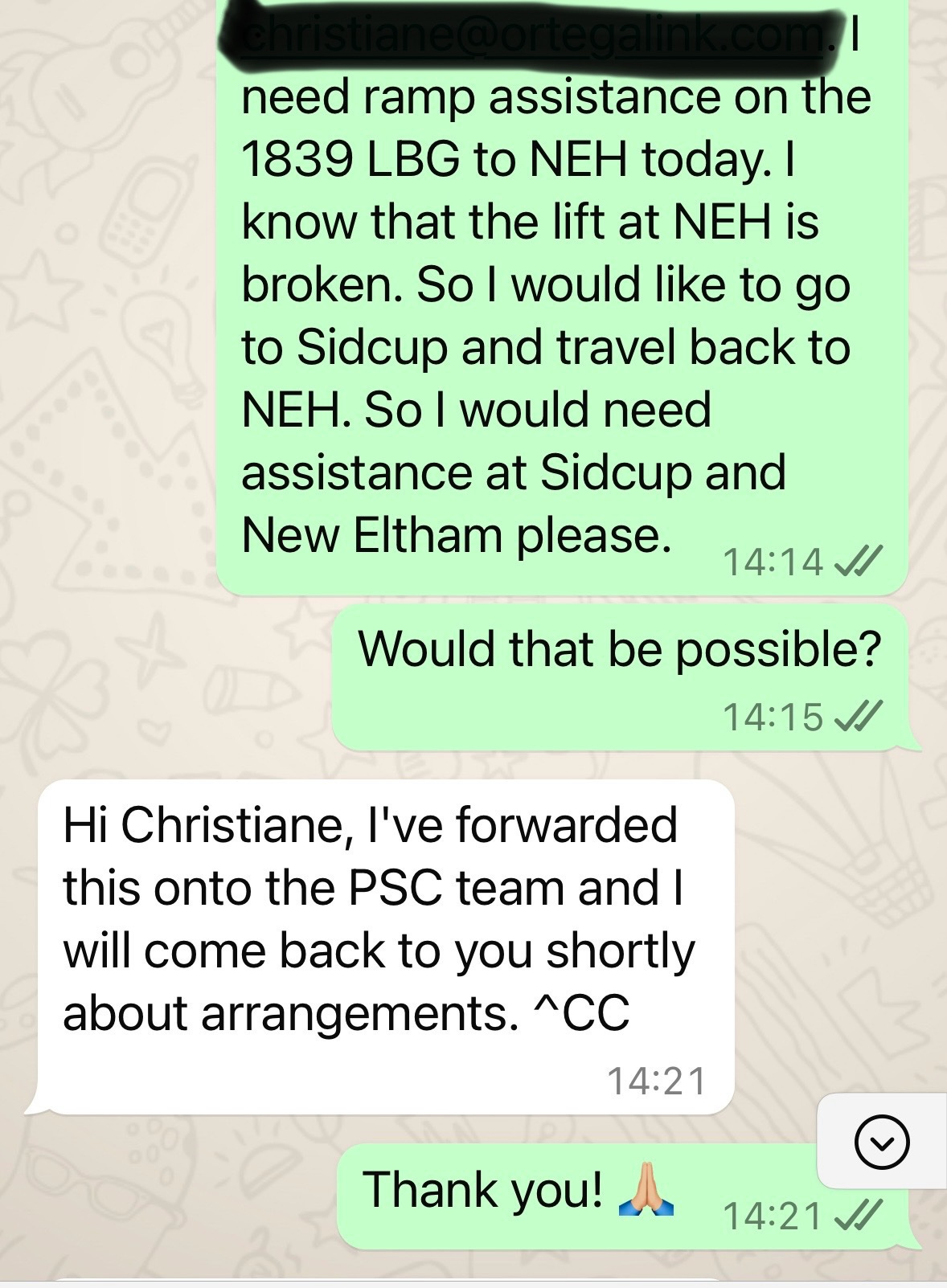The Power of Chats in Accessible Travel
Real-Time Communication like WhatsApp removes barriers
You can listen to the main article in this newsletter.
Last week, I went on a business trip to Glasgow, a seven-hour journey with multiple trains. Despite the challenges caused by Storm Bert and two broken lifts, the experience was surprisingly manageable, thanks to an ally: WhatsApp.
The Limitations of Traditional Booking Systems
The current booking assistance system for disabled rail passengers has shortcomings. As Tanni Grey-Thompson aptly described it, from a passenger perspective, it's "a glorified web form.” More flexibility and real-time responsiveness are needed to address the dynamic nature of travel.
The help points at stations and airports are important but may not be state-of-the-art in providing assistance when passengers have mobile phones that also serve as assistive devices, e.g., for blind people. WhatsApp is a mainstream app most people have on their phones already, so no new app installation is necessary.
East Midlands Airport introduced an award-winning WhatsApp service a couple of years ago. It was the idea of a Deaf member of their Accessibility Advisory Group, which I'm chairing. Wherever passengers are at the airport, they can request assistance. E.g. if there is a problem with the car park barriers, deaf people can chat with the control room.
WhatsApp: A Game-Changer for Accessibility
Real-time communication chats like WhatsApp are powerful tools for improving accessible travel, and they are far more accessible than help points. Help points are a barrier for a lot of disabled people. Blind people have issues finding them, Deaf people can't use them at all, and neurodivergent people often don't use them either.
Additionally, chats offer several advantages over traditional booking methods:
1. Immediate Response: Travellers can get instant assistance and updates.
2. Flexibility: Plans can be adjusted on the go, accommodating delays and unexpected issues like broken lifts or unavailability of staff.
3. Reassurance: Direct communication provides comfort and confidence to travellers.
4. Accessibility: People can use their mobile phones to get assistance, don't have to move around the station to find a help point or must be able to hear or speak.
5. Availability of assistance: Assistance is possible wherever the customer is, not where the help point is.
A Journey of Adaptability
My return journey from Glasgow to London via Edinburgh shows how useful this can be for train operators. With a 4+ hour journey ahead and potential delays, pre-booking assistance for onward connections seemed impractical. Instead, I used WhatsApp to communicate with the train operator of my last leg. My local station had a broken lift to make things more complex. Filling out a standard booking form wouldn't have helped much when already en route to the last leg of the journey. On top of this, my inbound train was delayed, and so was I for the last two legs of my trip. There were disruptions at London Bridge, leading to overcrowding, including the overloading of a lift that went out of service.
So I had two broken lifts instead of one. Despite these challenges, the staff member I communicated with via WhatsApp was exceptionally helpful. We quickly discussed alternative plans and trains that involved using a different train from another platform 30 minutes later.
Rethinking "Travel with Confidence"
The railway industry often speaks of "travel with confidence." However, the current assistance booking system can create a false sense of security. To solve the complex challenges that arise during travel, more than a booking app is needed. Being able to talk to the control room when anything goes wrong with the assistance is pretty reassuring.
Requiring disabled passengers to book assistance in advance through a very rigid booking form or by phone to a 3rd party call centre places an unfair burden on disabled people. It shifts the responsibility of navigating an inaccessible system onto the customer. True equality in travel means providing flexible, real-time solutions that can adapt to the unpredictable nature of journeys.
My vision for accessible travel is that the passenger communicates where they are and what help they need in real-time, and the assistance comes to them, not the other way around. Turn Up and Go becomes a basic provision and real-time support when needed comes on top.
Finding staff members at stations and airports is already tricky, especially if the passenger is blind or has difficulties wandering around searching for someone. If the passenger could chat with the destination, it would also minimise so-called failed assists ( e.g., when assistance doesn't show up at the destination). I can message my allocated taxi driver; why can't I message my destination after boarding a train?
Embedding real-time communication into assistance services makes travel more accessible and less stressful for disabled passengers. Train operators and airports can offer more responsive, flexible, and ultimately better services to all travellers. I used five trains to get home from Scotland, and despite delays, disruptions and two broken lifts, the assistance worked thanks to WhatsApp.
Some interesting links
Industry leaders have gathered at Micromobility UK 2024 in Warwick to discuss how shared micromobility should be made more inclusive for disabled people.
You probably do not understand accessibility - this article discusses what accessibility is, what it isn't, and why you should learn not to be afraid of it.
Judge rules all new New York City taxis must be wheelchair-accessible until city meets settlement requirement
Something to listen to
The Business Disability Forum podcast discusses purplewashing, why it matters, and gives advice on how to avoid it. The guests debate questions, such as: Does it matter if businesses are making themselves look better, if they are achieving positive change? Should businesses wait until they are ‘perfect’ to share good news? How do we encourage businesses to take meaningful action on disability inclusion?
Some final words
The Accessible Link is a reader-supported publication. So, if you like what you’re reading, consider to
As a paid subscriber you will receive an additional edition every two weeks with best-practice tips on improving accessibility in your organisation.
Who is writing this newsletter?
I’m Christiane Link, and I improve the customer experience in aviation, transport, and travel. I worked as a journalist for over two decades and travelled extensively for business and leisure. I’m a wheelchair user.
Work with me
Whether you're a Customer service director, a Head of Customer Experience, a corporate Accessibility manager, a DEI leader, a transport planner, or a disabled employee resource group member, I can help you to make your organisation more inclusive. You can book me for speaking engagements or hire me as a consultant for your accessibility or DEI strategy, communications advice and other related matters. I have worked for airlines, airports, train operators, public transport providers, and companies in other sectors.
If you want to read more from me, follow me on LinkedIn, Twitter, Bluesky or Mastodon. You can also reply to this email if you want to contact me.
.





